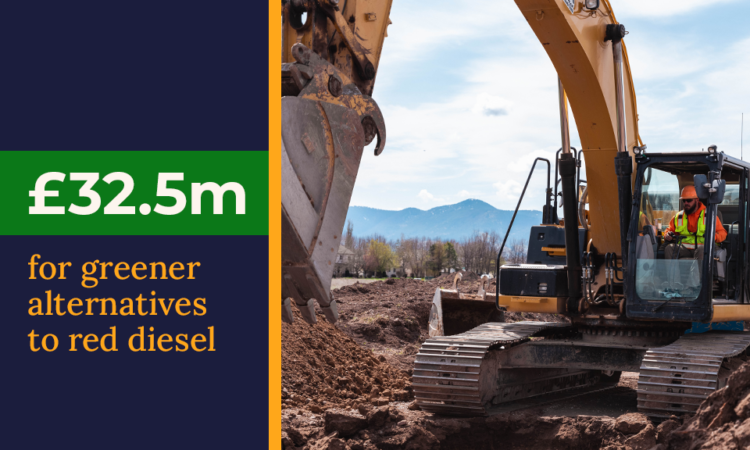
- New government funding will support British industries, including construction, mining and quarrying, to reduce their reliance on fossil fuels
- support will develop greener alternatives to red diesel such as electrification and green hydrogen, providing a pathway for industry to cut their emissions and energy costs
- this is the UK government’s latest step in driving industrial energy independence and encouraging green investment across the country
British industrial sectors, including construction, mining and quarrying, will be supported in their plans to develop greener technologies and low carbon fuels, as the government backs industry with a £32.5 million funding package to cut reliance on fossil fuels and boost energy resilience.
The funding announced today (Friday 20 January) will help these industries move away from using red diesel, also known as gas oil, which is a type of fossil fuel commonly used for off-road, heavy-duty vehicles and machinery, such as bulldozers and cranes.
The funding is being made available through the second phase of the Red Diesel Replacement Competition, which supports projects that seek to develop red diesel alternatives. The £32.5 million package will support three to five demonstration projects that participated in Phase 1 of the programme.
This next phase of funding will support industry to reduce their reliance on fossil fuels, while also helping to cut industry emissions and energy costs, supporting the UK’s commitment to transition away from red diesel to help meet its climate change and air quality targets.
Minister for Energy and Climate Change Graham Stuart said:
These industrial sectors, and the jobs they create, are crucial to our economy, and they also have an important role to play in our shift towards a greener, more secure future.
This latest round of funding will help to speed up industrial decarbonisation, providing industry and consumers with effective low-carbon alternatives to red diesel while boosting green investment to future-proof the resilience of British industry.
The funding announced today follows £6.7 million funding provided to 17 winners under Phase 1 of the competition, in areas covering electrification, e-fuels and green hydrogen, as well as technologies that capture and store energy which would ordinarily be wasted from a vehicle or machine.
Examples of previous winners from Phase 1 include:
MAHLE Powertrain Ltd, Northampton: In partnership with The University of Nottingham and Clean Air Power, MAHLE Powertrain Ltd received £425,072 to build two prototype engines capable of running on ammonia and hydrogen, with the aim of providing a pathway for the sustainable use of heavy-duty engines.
CATAGEN Ltd, Belfast: received £787,700 for two projects, an e-fuel generator to develop e-diesel, and a novel hydrogen compressor.
ULEMCo Ltd, Liverpool: In partnership with Skanska and Building Research Establishment (BRE), UMLECo Ltd received £418,613 to develop and deploy a H2ICED® combustion engine for onsite construction equipment, a world first in converting a piling machine (used in the construction industry) to run on hydrogen fuel.
Steamology Motion Ltd, Salisbury: received £364,717 to build a prototype demonstrator of their high power, zero-emission steam turbine drivetrain, proving a viable red diesel engine replacement technology.
Today’s announcement forms part of the £1 billion Net Zero Innovation Portfolio, which helps to accelerate the commercialisation of low-carbon technologies, systems and business models in power, buildings, and industry.
Switching industry to lower carbon fuels, supported through schemes such as the Red Diesel Replacement competition, will be critical for reducing emissions to meet the UK’s net zero objectives.
Jonathan Hall, Head of Research & Advanced Engineering at MAHLE Powertrain said:
Off-highway industries such as mining, quarrying and construction remain a significant challenge in the transition towards a more sustainable future. These sectors have demanding energy and utilisation requirements and are often in challenging environments far from a power grid connection, making them difficult to electrify.
Exploring other power sources such as ammonia has considerable potential, and the funding provided by BEIS via the Red Diesel Replacement programme has enabled us to develop these innovative, zero-carbon powertrain solutions.
Dr Andrew Woods, CEO and Co-Founder of CATAGEN said:
The purpose of CATAGEN is ‘to clean and decarbonise the air’ and the RDR funding from BEIS has allowed the team to rapidly build two new technologies in 2022. They form part of CATAGEN’s new ClimaHtech product range, a configurable system which uses advanced climate technologies to produce green hydrogen and e-fuels. We are committed to finding a collective solution that will cut CO2 emissions and decarbonise challenging sectors such as industry, shipping, and aviation.
BEIS have helped shine a spotlight on CATAGEN and our technologies which is now resulting in enquiries from across the globe from heavy industry and the automotive sectors. The BEIS team have been a great support to CATAGEN’s development teams, not only by providing funding but through their valued expertise and commitment to reduce emissions as well as creating jobs to support a new net zero economy in Northern Ireland and the UK.
Notes for editors
At Budget 2020, the government announced that it was removing the entitlement to use red diesel from most sectors from April 2022 to help meet its climate change and air quality targets.
BEIS launched the Red Diesel Replacement competition in September 2021 to provide grant funding to support the development and demonstration of innovative technologies to help decarbonise the construction, mining and quarrying sectors that will be most impacted by the removal of the red diesel rebate.
Phase 1 funding (feasibility and trials) was announced on 31 May 2022, committing £6.7 million of funding to seventeen projects over eleven months until 24 February 2023.
A total of £32.5 million is available for Phase 2, with BEIS looking to fund around three to five demonstration projects up until March 2025.






